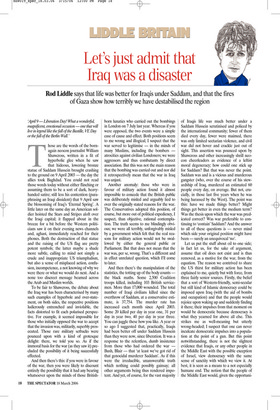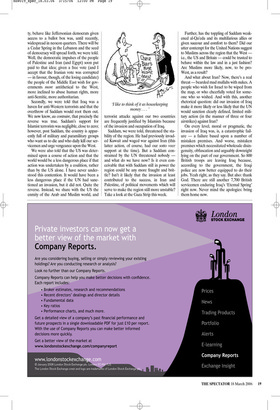Let’s just admit that Iraq was a disaster
Rod Liddle says that life was better for Iraqis under Saddam, and that the fires of Gaza show how terribly we have destabilised the region
‘April 9 — Liberation Day! What a wonderful, magnificent, emotional occasion — one that will live in legend like the fall of the Bastille, VE Day or the fall of the Berlin Wall.’
Those are the words of the bornagain neocon journalist William Shawcross, written in a fit of hyperbolic glee when he saw that hideous, lowering bronze statue of Saddam Hussein brought crashing to the ground on 9 April 2003 — the day the allies took Baghdad. You could not read those words today without either flinching or assuming them to be a sort of dark, heavyhanded satire; still less his contention (paraphrasing an Iraqi dissident) that 9 April saw the blossoming of Iraq’s ‘Eternal Spring’. A little later on the same day an American soldier hoisted the Stars and Stripes aloft over the Iraqi capital; it flapped about in the breeze for a bit before the Western politicians saw it on their evening news channels and, aghast, immediately reached for their phones. Both the destruction of that statue and the raising of the US flag are pretty potent symbols; the latter maybe a shade more subtle, calling to mind not simply a crude and inappropriate US triumphalism, but also a sense of misplaced action, confusion, incompetence, a not knowing of why we were there or what we would do next. And a none too discreet message beamed across the Arab and Muslim worlds.
To be fair to Shawcross, the debate about the Iraq war has been characterised by many such examples of hyperbole and over-statement, on both sides, the respective positions ludicrously entrenched and inviolable, the facts distorted to fit each polarised perspective. For example, it seemed impossible for those who initially opposed the war to accept that the invasion was, militarily, superbly prosecuted. Those rare military setbacks were pounced upon with a kind of grotesque delight: there, we told you so. As if the immoral basis for the war (as they saw it) precluded the possibility of it being successfully effected.
And then there’s this: if you were in favour of the war, then you were likely to discount entirely the possibility that it had any bearing whatsoever upon the minds of those British born lunatics who carried out the bombings in London on 7 July last year. Whereas if you were opposed, the two events were a simple case of cause and effect. Both positions seem to me wrong and illogical; I suspect that the war served to legitimise — in the minds of many Muslims, including the bombers atrocities against civilian Londoners; we were aggressors and thus combatants by direct association. But this was not the main reason that the bombing was carried out and nor did it retrospectively mean that the war in Iraq was unjust.
Another anomaly: those who were in favour of military action found it almost impossible to concede that the British public was deliberately misled and arguably lied to over the originally stated reasons for the war. The Conservatives adopted this position, of course, but more out of political expediency, I suspect, than objective, rational contemplation. The truth seems to me blindingly obvious; we were all terribly, unforgivably misled by a government which felt that the real reasons for military action would not be swallowed by either the general public or Parliament. But that does not mean that the war was, per se, wrong. That’s a different and in effect unrelated question, which I’ll come to later.
And then there’s the manipulation of the statistics, the totting up of the body counts the black maths. Some 2,500 Coalition troops killed, including 103 British servicemen. More than 17,000 wounded. The total number of Iraqi civilians killed since the overthrow of Saddam, at a conservative estimate, is 37,754. The murder rate has increased each month since April 2003. Some 20 killed per day in year one, 31 per day in year two, 40 per day in year three. You can juggle these how you like. A year or so ago I suggested that, practically, Iraqis had been better off under Saddam Hussein than they were now, since liberation. It was a response to the relentless, dumb insistence from those who had ordered the war Bush, Blair — that ‘at least we’ve got rid of that genocidal murderer Saddam’. As if this were the irreducible, unanswerable truth which nothing could possibly gainsay; all other arguments being thus rendered impotent. And yet, of course, for the vast majority of Iraqis life was much better under a Saddam Hussein scrutinised and policed by the international community; fewer of them died every day, fewer were maimed, there was only limited sectarian violence, and civil war did not hover and crackle just out of sight. This assertion was pounced upon by Shawcross and other increasingly shrill neocon cheerleaders as evidence of a leftist moral degeneracy; how could one stick up for Saddam? But that was never the point. Saddam was and is a vicious and murderous gangster (who, over the course of his stewardship of Iraq, murdered an estimated 60 people every day, on average. But not, crucially, in those last five years when he was being harassed by the West). The point was this: have we made things better? Might things get better in even the medium term? Was the thesis upon which the war was predicated correct? Was war preferable to continuing to ‘contain’ Saddam? And the answer to all of these questions is — never mind which side your original position might have been — surely an unequivocal ‘no’.
Let us put the stuff about oil to one side; in fact let us, for the sake of argument, assume that oil does not exist and is thus removed, as a motive for the war, from the equation. The reason we contrived to share the US thirst for military action has been explained to me, quietly but with force, from three fairly senior sources. Firstly, the belief that a sort of Western-friendly, semi-secular but still kind of Islamic democracy could be imposed upon Iraq (with the aid of bombs and occupation) and that the people would rejoice upon waking up and suddenly finding it there; their impulses from that moment on would be democratic because democracy is what they yearned for above all else. This strikes me as well-meaning but utterly wrong-headed; I suspect that one can never inculcate democratic impulses into a population at the point of a gun. But this point notwithstanding, there is not the slightest evidence that Iraqis, or any other people in the Middle East with the possible exception of Israel, view democracy with the same sense of sanctity with which we view it. At best, it is seen as a means to a not especially humane end. The notion that the people of the Middle East would, given the opportuni ty, behave like Jeffersonian democrats given access to a ballot box was, until recently, widespread in neocon quarters. There will be a Cedar Spring in the Lebanon and the seed of democracy will spread forth, we were told. Well, the democratic impulses of the people of Palestine and Iran (and Egypt) soon put paid to that idea; given a free vote (and I accept that the Iranian vote was corrupted — in favour, though, of the losing candidate) the people of the Middle East wish for governments more antithetical to the West, more inclined to abuse human rights, more anti-Semitic, more authoritarian.
Secondly, we were told that Iraq was a haven for anti-Western terrorists and that the overthrow of Saddam would root them out. We now know, au contraire, that precisely the reverse was true. Saddam’s support for Islamist terrorists was negligible, close to zero; however, post Saddam, the country is apparently full of military and paramilitary groups who want us to die and who daily kill our servicemen and urge vengeance upon the West.
We were also told that the US was determined upon a course of action and that the world would be a less dangerous place if that action was undertaken by a coalition, rather than by the US alone. I have never understood this contention. It would have been a less dangerous place if the UN had sanctioned an invasion, but it did not. Quite the reverse. Instead, we share with the US the enmity of the Arab and Muslim world, and terrorist attacks against our two countries are frequently justified by Islamists because of the invasion and occupation of Iraq.
Saddam, we were told, threatened the stability of the region. He had previously invaded Kuwait and waged war against Iran (this latter action, of course, had our sotto voce support at the time). But a Saddam constrained by the UN threatened nobody and what do we have now? Is it even conceivable that with Saddam still in power the region could be any more fraught and brittle? Isn’t it likely that the invasion at least contributed to the success, in Iran and Palestine, of political movements which will serve to make the region still more unstable? Take a look at the Gaza Strip this week. Further, has the toppling of Saddam weakened al-Qa’eda and its multifarious allies or given succour and comfort to them? Did our utter contempt for the United Nations suggest to Muslims across the region that the West i.e., the US and Britain — could be trusted to behave within the law and in a just fashion? Are Muslims more likely, now, to be proWest, as a result?
And what about Iran? Now, there’s a real threat — bearded mad mullahs with nukes. A people who wish for Israel to be wiped from the map, or who cheerfully voted for someone who so wished. And with this, another rhetorical question: did our invasion of Iraq make it more likely or less likely that the UN would sanction clearly defined, limited military action (in the manner of three or four airstrikes) against Iran?
On every level, moral or pragmatic, the invasion of Iraq was, is, a catastrophic failure — a failure based upon a number of mistaken premises. And worse, mistaken premises which necessitated wholesale disingenuity, obfuscation and arguably downright lying on the part of our government. So 800 British troops are leaving Iraq because, according to the government, the Iraqi police are now better equipped to do their jobs. Yeah right, as they say. But also: thank God. There are still another 7,700 British servicemen enduring Iraq’s ‘Eternal Spring’ right now. Never mind the apologies: bring them home now.



















































































 Previous page
Previous page